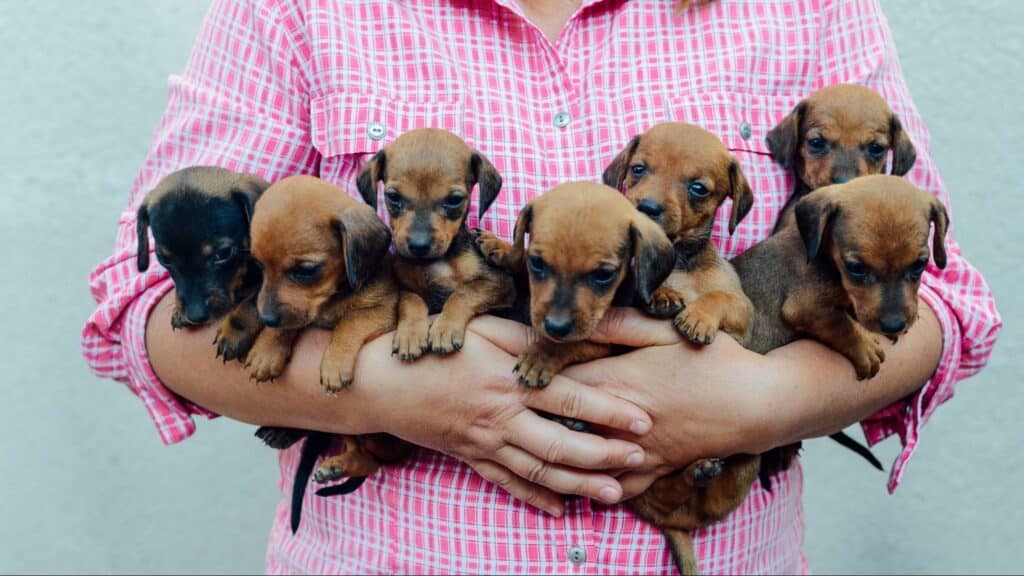There are a number of ways that you can avoid puppy mills when looking for a new pet. One of the best ways is to adopt from a shelter or rescue group. This ensures that your new pet comes from a loving home and has not been subjected to the inhumane conditions often found in puppy mills.
What Are Puppy Mills?
Puppy mills can be a danger for families that want to adopt a new dog. A puppy mill is a breeding facility with the sole purpose of churning out the most dogs for the least money – and to make the most profit. The dogs in these puppy mills are often kept in deplorable conditions, with little to no socialization, exercise, or veterinary care.
Why Should You Avoid Puppy Mills?
Substandard breeding conditions and inbreeding can lead to health and behavioral problems in the puppies bred there. Since the 1980s, the Humane Society of the United States has been fighting to shut down these facilities. They have been successful in shutting down some of the worst puppy mills and continue to fight for stricter laws and regulations.
Behavior Issues
Health Problems
Puppy mill dogs are often bred without regard for genetic defects that can be passed on to their puppies. These puppies are more likely to have congenital health problems, which may not be apparent until they reach adulthood.
Puppies from puppy mills are also more likely to be sick or have parasites when they are first adopted, requiring extra care and contributing to higher levels of stress as you worry about your puppy’s health.
How to Avoid Puppy MIlls
You can do your part by doing your research before you adopt! Here are some tips to avoid adopting from a puppy mill.
Stay Away From Pet Stores, Newspaper Ads, and Great Deals Online
The puppies in pet stores often come from puppy mills. The same is often true for puppies advertised in newspapers or online. If you see a too-good-to-be-true deal on a puppy, chances are it’s coming from a puppy mill. Be mindful of where you are looking for a new puppy, and you can make sure your new pet is healthy and comes from a good home.
Visit the Breeder and Ask Questions
A responsible breeder will be happy to answer your questions and show you around their facility. They should also have no problem providing you with references. If a breeder is not willing to let you visit their facility or answer your questions, you should consider adopting a puppy from somewhere else, as they may be running a puppy mill.
Adopt From a Shelter or Rescue Instead

There are millions of adoptable dogs waiting in shelters and rescues across the country. When you adopt, you save a life and provide a loving home to a dog in need. Puppy mills are cruel and inhumane facilities that should be avoided at all cost. By doing your research and adopting from a shelter or rescue, you can be sure you bring home a happy, healthy puppy and avoid supporting this cruel industry.
How to Spot a Puppy Mill
Puppy mills often sell their dogs through pet stores, newspaper ads, and online websites. Knowing how to identify a puppy mill can help you avoid supporting them.
Small Cages
One of the most obvious signs of a puppy mill is the small, cramped cages that the dogs are kept in. These cages can be stacked on top of each other, resulting in confined environments that make puppies anxious, and the dogs may not be let out enough for socialization and exercise, detracting from their growth.
Poor Sanitary Conditions
Puppy mills are often overcrowded and unsanitary. The dogs may not have enough food or water, and their waste may not be properly disposed of. This can lead to the spread of disease among the puppies.
Puppies Are Separated From Their Mom Early
Puppies should be with their mother for at least 8 weeks, but puppies in puppy mills are often taken away from their mothers much sooner. This can lead to emotional and behavioral problems in the puppies.
How to Tell If an Ad Is for a Puppy Mill
Some signs that an ad may be for a puppy mill include:
The Seller Has Many Breeds for Sale
If a single seller has multiple breeds of puppies for sale, they may be operating a puppy mill. Most reputable sellers specialize in certain breeds, so a diverse array of dogs may indicate less-than-ideal breeding and raising conditions.
Puppies Are Very Young
If the puppies are very young, they may have been taken from their mothers too early. This can cause health and behavior problems in the puppies, and it is a common practice in puppy mills.
The Seller Won’t Show You Where Puppies and Parents Are Kept
A responsible seller will want you to meet the puppies’ parents and see where they are being kept. If the seller is not willing to let you do this, you should question why they would be hesitant. Puppy mill owners are less inclined to show potential buyers their facilities because of the poor conditions the dogs live in.
You Don’t Go Through a Screening Process
Reputable breeders will want to know about your experience with dogs, your living situation, and whether or not you have another dog in the home. They will also likely require a home visit before selling you a puppy. If the seller does not screen you or ask any questions about your home, they may not be invested in the welfare of their puppies and may be operating a puppy mill.
Signs Someone Is a Reputable Breeder
There are many responsible, reputable breeders out there who take great care of their dogs and puppies. Here are some signs that you’re dealing with a responsible breeder.

They Show You the Puppy’s Parents and Home
A responsible breeder will want you to meet the puppy’s parents and see where they are being kept. This is so you can get an idea of what the puppy’s living conditions have been and make sure that the parents are healthy and well-cared for.
The Breeder Provides Medical Records
A respectable breeder will provide you with the puppy’s medical records, which should include information about their shots and any health problems they have. Gaining access to this information can help you feel confident that you are adopting a healthy puppy.
There’s a Waiting List
If a breeder has a waiting list for their puppies, it’s usually because they carefully screen their buyers and want to make sure that each puppy goes to a good home.











